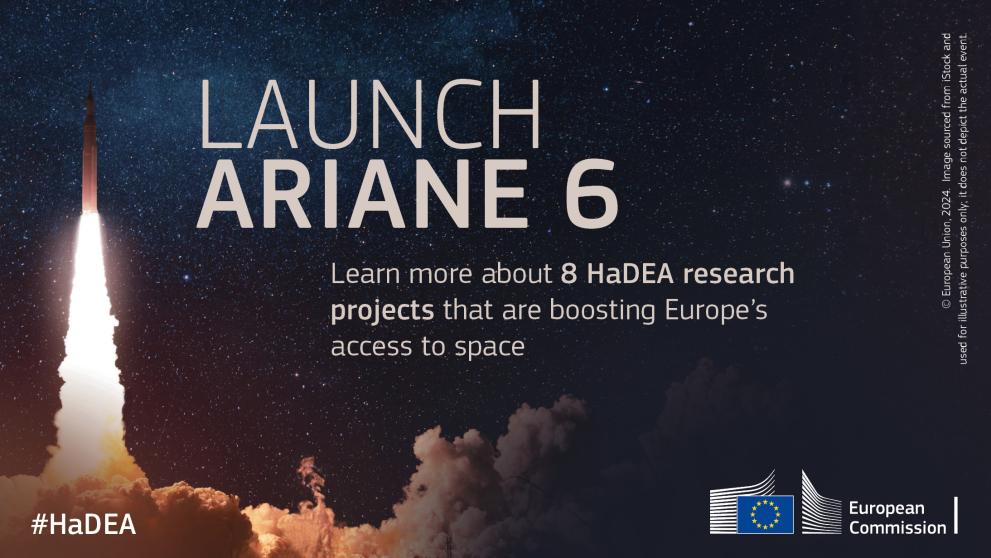
The successful launch of Ariane 6 marks a major milestone, as it enables Europe to realise its ambitions on the world stage to ensure autonomous access to space and to boost its longstanding expertise in launching spacecrafts. The successor of the highly successful Ariane 5 is capable of launching a wide range of space missions and comes in two versions, depending on the power required (Ariane 62 and 64).
Independent access to space is fundamental to the EU’s space policy, as it enables the implementation of EU Space Programme components such as Galileo and Copernicus. In the current globally competitive environment, ensuring a cost-efficient, responsive and flexible European launch industry is also essential to reinforce Europe’s strategic autonomy and industrial competitiveness.
Funded through Horizon 2020 and Horizon Europe, a cluster of EU space research projects is enabling the development of innovative launch system components, disruptive propulsion systems, new space transportation solutions and related industrial processes. In order to achieve significant cost reductions and improved launch system flexibility, these projects support a variety of activities in several key domains. Discover some of the projects:
European strategic space launchers
SALTO aims to raise the maturity level of the first European reusable rocket technology, significantly reduce launch costs, ensure improvements in the environmental footprint and strengthen Europe’s competitiveness in strategic space missions. Complementary and in coordination with the ESA European THEMIS demonstrator programme, SALTO will perform, for the first time in Europe, fly / recover / re-fly cycles of a reusable rocket first-stage demonstrator, which will be conducted in Kiruna, Sweden.
ENLIGHTEN focuses on developing new technologies to reduce costs of access to space, while increasing competitiveness of current and future Space Transportation Systems (STS) in Europe. Building upon the results of the ESA Prometheus engine and focusing on the Oxygen-Hydrogen version, it is introducing new concepts for the production and exploitation of liquid engines by developing new technologies including large scale additive layer manufacturing and Engine Health Monitoring System that uses AI solutions.
ENLIGHTEN-ED, a follow-up project to ENLIGHTEN, seeks to develop advanced production means of technologies for reusable rocket engines, in order to create a family of reusable, high-power engines fueled by Liquid Oxygen and green hydrogen. The project will further mature enabling technologies, subsystems, tools and processes developed in ENLIGHTEN and will perform engine on-ground demonstration tests by 2026 for these technologies to reach TRL7.
European test, production and launch facilities
Eu-BEST seeks to revolutionise space infrastructure testing by developing and operating a modular and mobile test bench for rocket engines and stages, serving multiple launchers across various locations. By leveraging the latest technologies and industry best practices, the project aims to set new standards for space testing, contributing to the advancement of Europe’s space transportation and ground technologies. A first product able to test engines up to 500kN will be deployed and tested.
Low cost launch systems and services for small satellites
RRTB investigated a disruptive recovery system for small rockets. The project results helped to push forward progress on designing reusable launch vehicles, and highlighted critical considerations to be
taken into account. Next steps include building on several of the key technologies, such as the re-entry decelerator device, thermal protection systems, and cryogenic tanks.
ENVOL managed to design an innovative micro-launcher for small satellites based on Hybrid propulsion and to test several critical technologies. Through simulations, it demonstrated the prototype’s potential ability to deliver the required payload to the correct position. The project outcomes represented an important step forward in showing the ability in Europe of meeting the expected increased demand for small-satellite launches.
New space transportation solutions and services
SAFEST wants to transform the space launch sector by transferring safety operations from the ground to an Autonomous Flight Termination Unit (AFTU) on board the launcher, based on a modular avionics architecture. The project aims to achieve lower costs, more efficient operations, and a reduced environmental impact of space transportation. Watch this project video for more details.
ICARUS will demonstrate the feasibility of developing an inflatable heat shield (IHS) for recovering rocket stages from space. The system could also be used to protect precious cargo during re-entry and descent to Earth, and could eventually even be used for Mars missions. The project builds on the results of EFESTO and EFESTO-2, and officially kicked off on 1 June 2024.
Background
EU Space Research aims to foster a cost-effective, competitive, and innovative space industry and research community. Under Horizon Europe Cluster 4 – Space (Destination 5), HaDEA is funding projects that prepare future evolutions of the EU Space Programme components, foster the EU space sector’s competitiveness, reinforce its independent capacity to access space, and secure its autonomy of supply for critical technologies.
Relevant links
Details
- Publication date
- 10 July 2024
- Author
- European Health and Digital Executive Agency
- Programme Sector
- Space
- Programme
- Horizon Europe Cluster 4: Space
